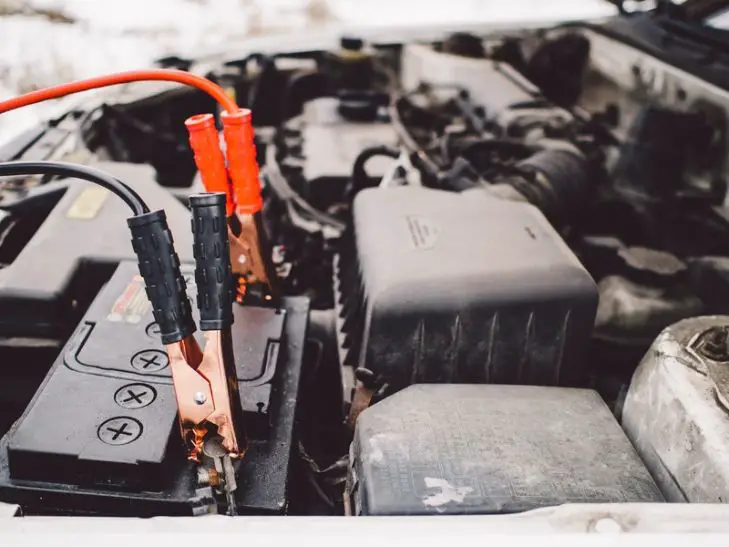Most electrical equipment in the car depends on the battery performance. If the battery condition deteriorates, you are likely to experience subpar performance. One of the most common phenomena that happen to batteries is terminal corrosion. So, can corroded battery terminals cause a car not to start?
Yes, if the terminal gets corroded to a certain extent then it can hinder the car engine from starting. If this happens due to a shortage of electric current required for engine start.
In this post, I’ll explain why corrosion takes place to what can you do about it. So, stick with me, and let’s get going.
Can Corroded Battery Terminals Cause A Car Not To Start
Consider yourself an electron traveling down a sidewalk.
When you come across a gap in the sidewalk that is deep but just a foot wide and extends as far as you can see to the left and right, no problem, you can simply leap, right?
But if the gap is 20′ wide, you’re not going to make it unless you have superhuman abilities.
This is exactly the situation electrons face on a corroded terminal. Corrosion and rust make it harder for the electrons to flow through and that leads to failure to engine start.
Can Battery Corrosion Keep The Car From Starting?
Yes, battery corrosion can keep the car from starting. It will only happen when there is too much corrosion buildup. Rust and decay on the terminal adversely affect the current flow and causes the problem.
Corrosion causes faulty cable connections, which frequently result in the inability to start.
This used to be a prevalent issue, but it’s becoming less so since contemporary automobiles have stronger alternators with better voltage management and batteries that are built differently.
What Happens When Car Battery Terminals Are Corroded?
The terminal ends of the battery serve a basic but crucial purpose. They link the electrical system of the automobile to the battery. Lead or other heavy-duty, highly conductive metals are used in these terminal ends. They also have low electrical resistance.
Corrosion has an impact on a car’s complete electrical system. It prevents the battery from receiving electricity.
As a result, your vehicle’s electrical system begins to malfunction. The vehicle’s engine also refuses to start. Your car’s onboard computer may also be having issues.
How Do You Fix A Corroded Battery Terminal?
Disconnect the cables: Make sure to detach the negative battery wire before the positive battery cable to prevent being electrocuted and severely burned.
Check cable for damage: Non-starting engines are frequently caused by damaged or worn battery wires. If the cables’ insulation shows symptoms of corrosion or is frayed, splintered, peeled, dried, or cracked in any manner, you should get them replaced as soon as possible.
Removing corrosion:
- Using cleaning agent: The best option is to use commercial-grade battery cleansers. These will not only remove the rust from the battery but will also neutralize the acid in the battery.
- Baking Soda method: To make the solution, all you need is a glass of water and a teaspoon of baking soda. Scrub the corroded areas with the solution using an old toothbrush or bristles brush.
Rinse and dry: you’ll want to scrape the corrosion away with a toothbrush or a bristles brush. To keep your automobile safe from potential harm, don’t let the solution or corrosive materials fall on other engine components. If at all feasible, we recommend that you remove the battery fully.
Does A Corroded Battery Need To Be Replaced?
Corrosion is more likely to occur as a battery age. This is why, if an old battery shows any signs of deterioration, it should be changed. You should also replace the battery if it is leaking.
The battery terminals might be entirely destroyed if the corrosion becomes severe. The battery is no longer usable in this situation. As a result, you’ll need to get a new battery for your automobile to run properly.
Will Corrosion Drain the Car Battery?
You’d need a complete channel from the corrosion products to the next terminal, as well as being wet. A full route is required for the current to flow. So, no. The corrosion is unlikely to drain the car battery.
More than likely, the corrosion indicates that the battery is leaking and, as a result, losing capacity. It may look as if the charge is draining, but the capacity of the cells is really decreasing. Corroded connections also produce excessive resistance, making it harder to start the engine and giving the impression that the battery is losing charge.
What Causes Car Battery Corrosion
The sulfuric acid inside the battery releases hydrogen gas, which causes battery deterioration. As the gasses react with the surrounding atmosphere, a corrosive environment emerges.
Moisture and salts, on the other hand, just speed up the process. Battery terminal corrosion usually develops on the negative battery terminal and is a sign that the vehicle’s battery has been undercharged.
Bottom line
The answer to the question can corroded battery terminals cause a car not to start, is yes it can. Car battery corrosion is not something that cannot be stopped. It is a natural process that takes place when reactions happen inside.
Although there is no way to stop corrosion, there are steps you can follow to slow the process.
Related Posts:
